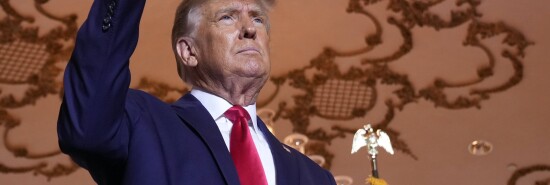
Only the best people? Questions about who might staff a second Trump White House
W. James Antle III
Video Embed
The latest controversy embroiling former President Donald Trump illustrates a dilemma that lies ahead if he were to win another term: who would staff a second Trump administration?
No, it probably wouldn’t be notorious white nationalist Nick Fuentes. But the most charitable interpretation of their Mar-a-Lago meeting is that there are currently no gatekeepers in Trump’s orbit willing or able to keep such people away from a once and perhaps future president. And who is to say that Trump, who did hire Omarosa Manigault Newman, wouldn’t be drawn to the troubled Kanye West?
Personnel is policy, they say in Washington. For Trump, that has long been a problem.
POLITICAL POLARIZATION CONTRIBUTED TO UNEXPECTEDLY CLOSE MIDTERM ELECTION
Trump’s efforts to reorient the Republican Party during his first term were thwarted by subordinates who did not agree with him, as well as the lack of experience and qualifications of some who did.
Originally, Trump did not understand it was important for the people who worked for him in government to actually share his views. Because he disagreed with the most recent previous Republican president, George W. Bush, on such issues as trade, immigration, and foreign policy, it was not a given that simply promoting officials from the last GOP administration would ensure the implementation of his agenda.
Jeff Sessions, who agreed with Trump, was hounded out of the administration because of a perceived lack of personal loyalty. John Bolton, who disagreed with Trump on his core issue portfolio but was good on television, was briefly elevated to national security adviser.
Is it any wonder that tasks like building the border wall and withdrawing from Afghanistan remained incomplete under Trump’s watch?
Just as establishment Republicans in the mold of George H.W. Bush often outmaneuvered less governmentally experienced movement conservatives under Ronald Reagan, latter-day Bushies did the same to nascent MAGA set under Trump. But Reagan’s two terms did far more to prepare the Reaganites to govern in the future than anything that happened for populists and nationalists during Trump’s one.
At the same time, Trump was often saved from his own most self-destructive tendencies by conservative governing professionals like former Attorney General Bill Barr, former White House counsel Don McGahn, and a nontrivial section of the Cabinet. Such officials aided him in building a constitutionalist majority on the Supreme Court, while outside agitators who never should have had access to the Oval Office in the first place helped fan the flames of Jan. 6.
Most presidents arrive in Washington with longtime aides who are invested in both the agenda and them personally. Trump’s personal loyalists were family members, like Jared Kushner and Ivanka Trump, who didn’t really share his politics. Those more aligned with him, like Steve Bannon, were relative newcomers to his circle. Even Kellyanne Conway had worked for a pro-Ted Cruz super PAC during the same cycle in which she managed Trump’s winning presidential campaign.
One Trump insider said that during the first term, there were people who were personally loyal to the president, people supportive of his policies, and people skilled at navigating Washington. Seldom did anyone check all three boxes, or even two.
The end result was constant infighting and turnover.
If a second Trump term is to be about ambitious goals like dismantling the administrative state or making the GOP a multiracial workers party rather than personal grievances and settling scores, pillow-makers, legal cranks, and alt-right trolls will not be up to the task.
That assumes, of course, that Trump wants to do big things rather than little things, that people familiar with the ways of Washington will be as willing to work for him when he isn’t constitutionally eligible to run for reelection as they were in 2017, or that the outsiders and self-styled swamp-drainers have acquired the skills they need to govern successfully in the absence of the Republican old guard.
Trump can be a champion of the West, or of Kanye West. He can’t, at this point, be both.
These questions are a big reason why even some Republicans appreciative of Trump’s accomplishments and uninterested in seeing the party revert back to what it was like before 2016 are starting to look elsewhere for leadership ahead of the 2024 primaries.
CLICK HERE TO READ MORE IN THE WASHINGTON EXAMINER
The former president, who once prided himself on hiring only the best people, likely believes that shedding the professionals and replacing them with unorthodox outsiders will take him back to what originally worked for him.
Perhaps, but it also risks a repeat of his gravest failures.
